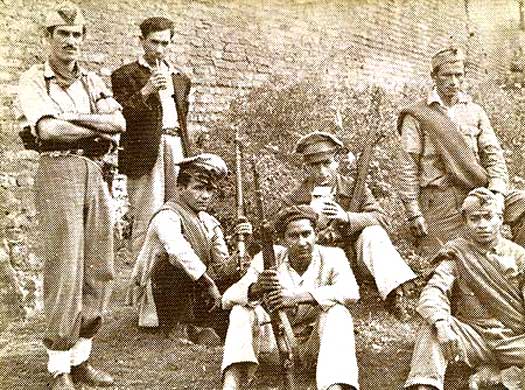Original Post
inquisition
Not Affiliated With the Spanish Church
- Location
- Valkenheim
The Drums of War
Long-Forgotten Sequel to "Turn of the Century"

Long-Forgotten Sequel to "Turn of the Century"


Nation Name In Native Language - 1935-36
National Flag
Name: Nation Name in English
Head of State: Name
Head of Government: Name
Type of Government: Self-explanatory
Population: Use populstat for a basic idea; if you have questions, PM me
Capital: Capital
Domestic
Internal Events:
-Any internal events to talk about...
Economic Status:
-Great (Example)
-Economic information goes here....
Military
-All military information not dealing with the numbers themselves goes here...
Army:
Diplomacy:
National Flag
Name: Nation Name in English
Head of State: Name
Head of Government: Name
Type of Government: Self-explanatory
Population: Use populstat for a basic idea; if you have questions, PM me
Capital: Capital
Domestic
Internal Events:
-Any internal events to talk about...
Economic Status:
-Great (Example)
-Economic information goes here....
Military
-All military information not dealing with the numbers themselves goes here...
Army:
- Number of Men in total currently in the active military
- Number of Reserves (State whether or not they are demobilized here, in parentheses)
- Number of Tanks
- Type of ships...
- Type of ships...
- Type of ships...
- Type of planes...
- Type of planes...
- Type of planes...
Diplomacy:
Espionage Format:
YOUR NATION: the name of your nation
TARGET: who your espionage is aimed at
MISSION: what you want to do
METHOD: how you plan to do it
MOTIVE: why you want to do this
OTHER: anything else relevant to the mission, ex: a trading company in the same city that could supply your spies with weapons
YOUR NATION: the name of your nation
TARGET: who your espionage is aimed at
MISSION: what you want to do
METHOD: how you plan to do it
MOTIVE: why you want to do this
OTHER: anything else relevant to the mission, ex: a trading company in the same city that could supply your spies with weapons
Warplan Format:
YOUR NATION: the name of your nation
ALLIES: any allies
COMBINED FORCES: the total number of men you are sending and however many men your allies are contributing
OPPOSING NATION(S): who you are fighting
THEATRE(S): where you are fighting
MILITARY DOCTRINE: the style of war your military is orientated towards, about a paragraph
MILITARY GOALS: what you are fighting for
STRATEGY: how you will fight on a strategic level – don't bother listing battlefield tactics, this should just be about where your men go and what they try to capture
YOUR NATION: the name of your nation
ALLIES: any allies
COMBINED FORCES: the total number of men you are sending and however many men your allies are contributing
OPPOSING NATION(S): who you are fighting
THEATRE(S): where you are fighting
MILITARY DOCTRINE: the style of war your military is orientated towards, about a paragraph
MILITARY GOALS: what you are fighting for
STRATEGY: how you will fight on a strategic level – don't bother listing battlefield tactics, this should just be about where your men go and what they try to capture
DA RULES
- Be civil to each other and respect the site rules.
- Aside from the "reclamation exceptions" (see below), this game uses the three-claims system.
- All warplans, tech requests, and espionage plans will be sent to me, and I will delegate them to the correct mod.
- All warplan appeals should be given a minimum of 24 hours after the results are posted.
- Have fun!
God-Mod of Nationgamekind: Myself
War/Espionage Mod(s): @Alexo (South Asia)
NPC Mod(s): @Alexo (South Asia)
DRAMATIS PERSONAE
Empire of France: @Carro Armato
Empire of Prussia-Poland: @ChineseDrone
Union of Eurasian Societist Republics: @Sidheach
United Kingdom of Great Britain: @Comrade Jeff
Kingdom of Italy: @ChaoticGenius
United Kingdom of the Netherlands: @Arthur Frayn
Kingdom of Hungary: @KnightofTempest
Confederation of Austria-Bavaria-Rhineland (West Germany): @Watercress
Kingdom of Sweden: @Alex Costa
United States of America: @Alexo
Federal Republic of Colombia: @The Lone Taco
Popular Republic of Brazil: @Pirx
United States of Mexico: @emberofshadow
Empire of Japan: @bigseb31213
Republic of China: @Louis Dabout
Last edited:

